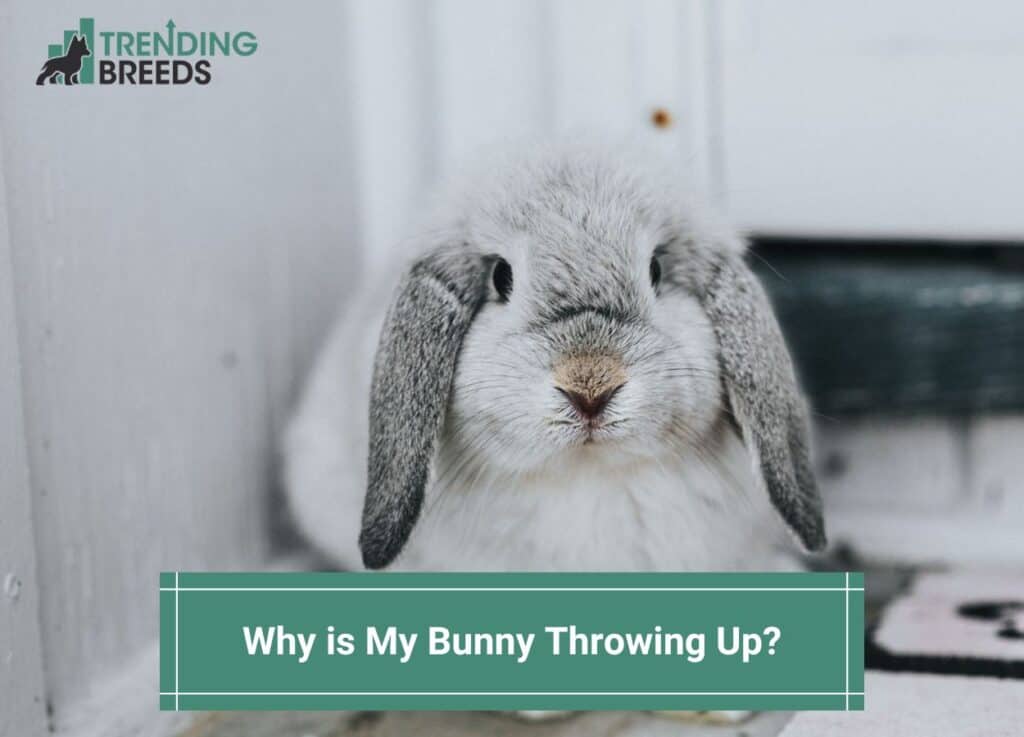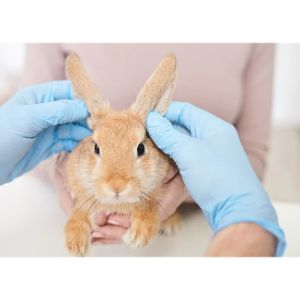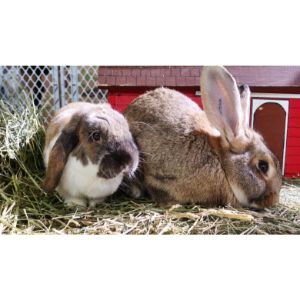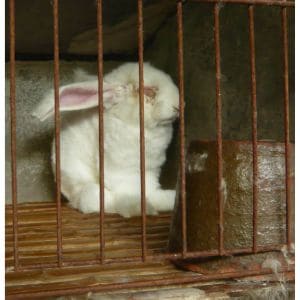
Your rabbit may be spotted jumping one second and coughing for his life the next. You could be worried about your animal friend if you see him or her struggling to vomit or cough up. This is probably something you have never seen before.
In actuality, your rabbit is not throwing up. Technically, rabbits are unable to vomit. Your rabbit may well have choked on its pellets if you witnessed any symptoms resembling vomiting, including fluids or food coming out of its mouth or nose.
We go into more depth about this below, so keep reading.
Other articles you would like: Do Rabbits Have Claws? and How Long Can Bunnies Go Without Food?
Can Rabbits Vomit?

Rabbits can’t throw up. If you observe fluids or food pouring out of your rabbit’s mouth or nose, which is similar to vomiting, it’s likely that your rabbit may be choking or coughing.
This symptom of choking in rabbits is frequently confused with vomiting. Unluckily, this causes owners of rabbits to believe their pet is throwing up while, in reality, the rabbit is unable to do so.
Your pet may choke in a number of different ways. If a rabbit has a health issue or eats too rapidly, they risk choking.
With dry, stale food, a rabbit’s throat might get obstructed. Rabbits can also choke to death on any strange object. The indications that something is lodged in your rabbit’s throat are as follows:
- Lifting its head up or throwing it back as it tries to breathe
- Gnawing and anxiously fumbling for its mouth
- Noisy, rattling, or open-mouthed breathing
- Breathless and gasping
- Lips and nose appear blue because there is not enough oxygen
- Screaming
- Liquid or mucus coming from the nose and mouth
Many owners report seeing fluid when their rabbit is choking; the liquid is the consequence of the rabbit aspirating (inhaling something) and the lung’s response.
If you think your rabbit may have ingested a foreign item, a poison, or has a blockage in its digestive tract, don’t wait for it to puke it out. Instead, take your rabbit immediately away to the doctor’s office for treatment.
Why Can’t Rabbits Vomit?

Rabbits cannot vomit if the food they previously had does not suit their stomachs, unlike other animals. The diaphragm muscles in your rabbit are really frail and don’t have the ability to push food back up.
Mammals with the ability to vomit have cues that inform their brains to do so, in addition to the necessary physiological responses. Rabbits, however, do not experience that.
In rabbits, there is little nerve, mouth, throat, or shoulder activity, and vomiting is correlated with all of these. A rabbit can, nevertheless, taste and recognize a deadly or dangerous material. They are able to avoid the drug thanks to this sense.
What to Do If Your Rabbit Starts to Choke

There are normally two techniques to help a choking rabbit clear its throat. You may start by giving the following a shot.
- Aggressively press your bunny to your chest.
- Ensure that its neck and head are securely supported.
- The snout of your bunny should be facing downward. Although delicate, this action is essential.
- With your fingertips, rub the rabbit’s belly from the base of the stomach to the ribcage. You risk breaking a rib if you exert too much force. But you’ll have to apply some pressure.
A rush of air will happen since your rabbit’s lungs will be under strain. If all goes according to plan, this force will be enough to remove a stuck object from the neck.
After that, your rabbit’s mouth will let go of the object. The head is angled downward, so it won’t drop back down into the throat.
The second technique is called the rabbit Heimlich maneuver. This technique carries a high risk of injury to the rabbit’s vertebrae, even if it could save the animal’s life. Use this tactic only if there is no other option.
- Get your rabbit back under control first. Do not, however, position the rabbit on its back.
- Now firmly grasp your bunny. Wipe away any liquid that is dribbling from your rabbit’s mouth right away to prevent aspiration.
- Wrap the rabbit’s chest around your forearm, holding it in place with one hand. Make sure the rabbit’s head is situated lower than its chest and lungs.
- Utilize your second arm to wrap the rabbit’s back while supporting its head and neck using your palm.
- To push the food out from the rabbit’s trachea, quickly raise and lower your arms while holding your arms straight.
It could cause an infection or pneumonia in case there is any fluid still present in the bunny’s lungs. Therefore, it’s important to bring your pet to the vet so they can examine it. The veterinarian will explain whether extra therapy is necessary.
Can Rabbits Spit Things Out?

Rabbits have the ability to spit up anything they haven’t yet swallowed. The following circumstances can lead to a rabbit acting in this way:
1. Sucking on Things
Numerous rabbits like to chew on carpet, plastic, and other household materials. They won’t swallow it since they don’t enjoy the flavor; therefore, they would chew and spit it out.
You can prevent this by bunny-proofing the area where your rabbit plays. You can’t entirely prevent rabbits from chewing; it’s a natural behavior. Instead, direct them toward a secure chewable.
2. Consuming Pellets Too Quickly
To prevent choking, some rabbits would eat their pellets whole but spit some of them out afterwards.
You should always spread pellets if your rabbit eats them too rapidly. They will have to move more slowly as a result, greatly lowering the possibility of choking on their pellets.
3. Oral Health Issues
A rabbit’s teeth are constantly developing. If their teeth are not worn down, unpleasant protrusions in the mouth called molar spurs may form. Spurs are spikes that have the potential to sever the rabbit’s tongue, cheeks, and other soft oral tissues.
Check out these other articles: Rabbit Rescues In Wisconsin and Rabbit Rescues In California.
What Are the Symptoms of a Sick Bunny?

Following are some of the most common telltale signs that your rabbit is sick:
Changes in Appetite
It’s critical that you get in touch with your veterinarian right away if you find pet bunny isn’t eating as much hay as normal or if they are ignoring its pellets and fresh vegetables.
If your rabbit has been exposed to excessive or unexpected environmental stresses.
Is eating a poor-quality diet, or isn’t consuming the amount of fiber required to keep their digestive system operating, gastrointestinal stasis, a potentially fatal health condition, might develop rapidly.
Negative or Missing Fecal Output
Although it’s not the most spectacular part of being a bunny parent, it’s crucial to pay close attention to your rabbit’s excrement.
Watch out for soft stools or diarrhea, tiny or unusually shaped fecal pellets, uneaten or excessive cecotropes, and a lack of fecal production.
Abnormal Behavior
An energetic rabbit is a happy rabbit. Every day, rabbits should have enough time outside of their homes to run, leap, and roam in a secure, bunny-proof setting.
Rabbits should be on alert and moving around, even if they are confined to their cages. Although a decline in activity level as your bunny ages is quite natural, adjustments should be slow.
Your rabbit may be attempting to warn you that something is amiss if they suddenly or gradually become less willing to walk about, more reclusive, or hostile.
It’s important to take notice of any abnormal vocalizations or modifications to regular patterns of behavior. Although rabbits may make a variety of vocalizations, violent growling and teeth grinding are often concerning.
The mild, pleased “purring” sound is akin to teeth grinding, although teeth grinding is considerably louder and harsher and is typically an indication of discomfort.
Changes in Posture and/or Gait

Rabbits are quick-moving, nimble animals. Any abnormalities or shifts in their posture, agility, or movement may be cause for concern.
When a rabbit stumbles or staggers, they may also have their heads inclined to one side, a behavior is known as “wry neck” or head tilt.
The tilt may be constant or intermittent, and it may be brought on by anything from an ear problem to a neurological condition. Changes in posture are another indicator to look out for.
Missing or Dull Fur
It may indicate underlying health issues if you notice your bunny spending too much time grooming or itching. People frequently link external parasites like mites and lice to dull coats and hair loss.
There are a number of reasons why your lovely friend’s fur might be dull and/or thinning, despite the fact that these parasites can undoubtedly create abnormalities in the skin and coat.
Another possible cause of atypical coats is hormonal imbalance, which can also result from intestinal problems.
The biggest organ in rabbits, like many other animals, is their skin, which might also be the first place you see clinical symptoms if your child has a systemic health issue.
Difficulty Eating and Facial Swelling
Inconsistent eating habits, dropping meals, weight loss, drooling, and facial swelling are some of the most typical clinical indications that can be linked to dental illness.
Respiratory Symptoms
Due to their very fragile respiratory systems and requirement for nasal breathing, rabbits are particularly vulnerable to upper respiratory infections.
Although a runny nose can seem like a minor ailment, if it is not treated immediately, it can soon become more serious. Upper respiratory symptoms are frequently the consequence of a bacterial infection and can spread to other rabbits.
Conclusion For “Why is My Bunny Throwing Up”

Bunnies are similar to our other pets in a lot of ways, however, one difference is that bunnies cannot vomit.
Their anatomy is physically incapable of doing so. Therefore, if you have seen your bunny vomit, that may be another reason why you should get it checked out by your vet immediately.
You will also like:
- What Does It Mean When A Bunny Licks You?
- Why Did My Rabbit Die Stretched Out?
- How Long Can Bunnies Go Without Food?
You can learn more about bunnies’ health by watching “Daily Rabbit Health Check” down below:




